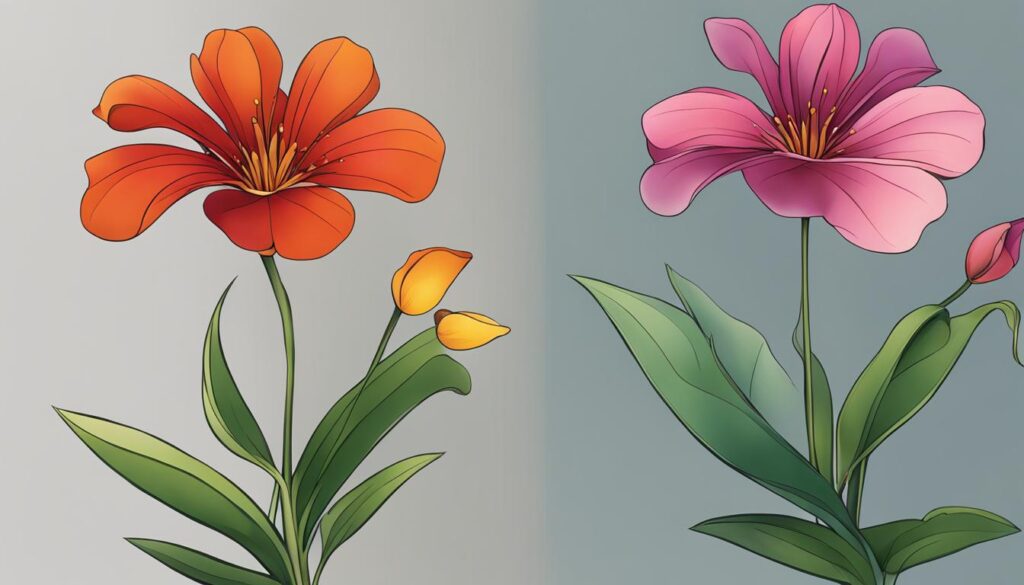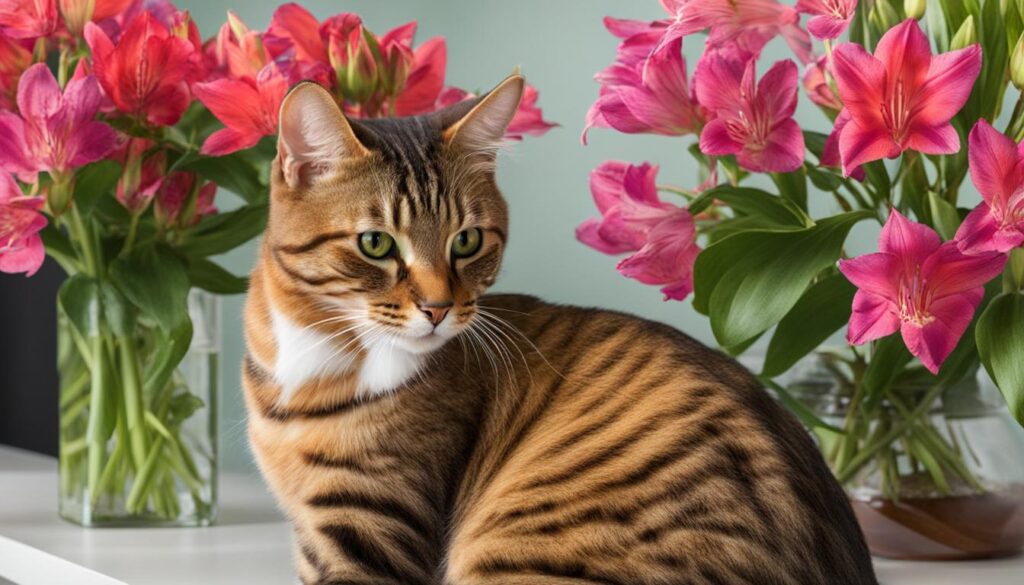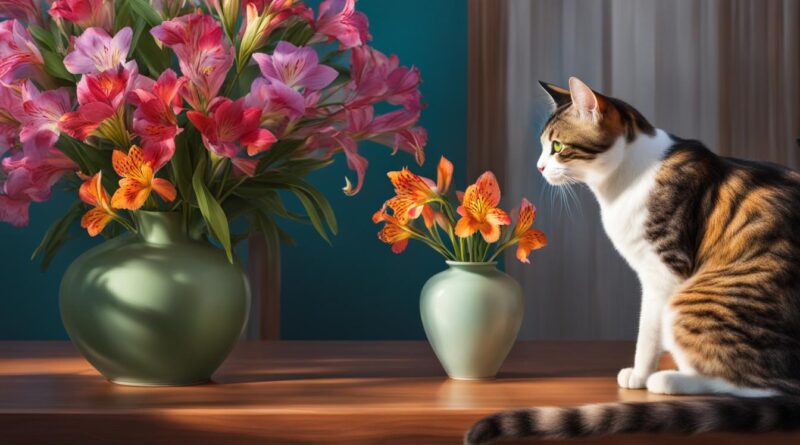Alstroemeria Toxicity in Cats: Safe or Not?
Are alstroemeria toxic to cats? Can cats safely be around alstroemeria plants or flowers? These are common questions among cat owners who want to ensure the safety of their furry friends. In this article, we will explore the potential toxicity of alstroemeria, commonly known as Peruvian Lily, and provide insights into keeping cats safe around these beautiful blooms.
According to the ASPCA, alstroemeria is generally considered safe for cats, dogs, and horses. However, it is important to note that the Pet Poison Helpline and medical texts list alstroemeria as mildly toxic. While alstroemeria is not a true lily and is less toxic than other lilies, it contains a substance called tulipalin A, which can cause irritant dermatitis, mild gastrointestinal signs, and discomfort if ingested in large amounts.
To ensure the safety of your feline companion, it is wise to keep alstroemeria plants out of their reach. This will help prevent any potential harm and ensure their well-being. Let’s delve deeper into the world of alstroemeria and its impact on cats.
Key Takeaways:
- Alstroemeria, also known as Peruvian Lily, is generally considered safe for cats but is mildly toxic according to some sources.
- It contains a substance called tulipalin A, which can cause irritant dermatitis and mild gastrointestinal signs if ingested in large amounts.
- To ensure cat safety, it is advisable to keep alstroemeria plants out of their reach.
- Alstroemeria is not a true lily and possesses less toxicity compared to true lilies like Easter Lily or Oriental Lily.
- If you notice any symptoms or concerns after exposure to alstroemeria, consult a veterinarian for guidance.
Alstroemeria Plants: Not True Lilies
Alstroemeria, also known as Peruvian Lily, Lily of the Incas, or Princess Lily, is often mistaken for a true lily. However, it is not a member of the lily family and is not botanically classified as a true lily. Alstroemeria plants have trumpet-shaped blooms and can grow up to three feet tall. They are tuberous perennials native to Chile and Argentina and come in various colors. Despite their similarity in appearance, alstroemeria plants do not possess the same level of toxicity as true lilies.
| Common Names | Scientific Name | Toxicity to Cats |
|---|---|---|
| Alstroemeria Plants | Alstroemeria | Less Toxic |
| True Lilies | Lilium | Highly Toxic |
While alstroemeria plants may cause mild irritation or discomfort if ingested by cats, they are not as harmful as true lilies. It is important to correctly identify the plant to ensure the safety of your feline friends. Alstroemeria’s distinct features, including its different scientific name and trumpet-shaped blooms, can help differentiate it from true lilies.
Toxicity Comparison: Alstroemeria vs. True Lilies
While alstroemeria is considered less toxic than true lilies, it is essential to understand the differences between the two when it comes to their impact on feline health. True lilies, including Easter Lily, Tiger Lily, and Oriental Lily, pose a significant risk to cats and can even lead to severe kidney failure with minimal ingestion. On the other hand, alstroemeria may cause mild irritation and gastrointestinal discomfort if ingested in large amounts. To accurately distinguish between alstroemeria and true lilies, it is crucial to consider key characteristics:
- Size: Alstroemeria typically has smaller flower heads compared to true lilies.
- Scent: Unlike true lilies, alstroemeria generally lacks a distinctive scent.
- Shape: Alstroemeria exhibits short petals, while true lilies feature elongated, narrow petals.
By examining these features, pet owners can differentiate between alstroemeria and true lilies, ensuring the safety and well-being of their feline companions.

| Alstroemeria | True Lilies |
|---|---|
| Mildly toxic | Highly toxic |
| Can cause irritant dermatitis and mild gastrointestinal discomfort if ingested in large amounts | Can lead to severe kidney failure even with minimal ingestion |
| Smaller flower heads | Elongated, narrow petals |
| No scent | Distinctive fragrance |
Lilies Toxic to Cats
When it comes to lilies, cat owners should be cautious as there are several varieties that are highly toxic to cats. Ingestion of these lilies can lead to severe symptoms and be life-threatening to our feline friends. It is crucial to recognize and avoid these toxic lilies to ensure the safety of our beloved pets.
| Lily Varieties | Toxicity Level |
|---|---|
| Easter Lily | Highly toxic |
| Tiger Lily | Highly toxic |
| Wood Lily | Highly toxic |
| Asiatic Lily | Highly toxic |
| Oriental Lily | Highly toxic |
| Stargazer Lily | Highly toxic |
| Rubrum Lily | Highly toxic |
| Lily of the Valley | Highly toxic |
| Gloriosa Lily | Highly toxic |
In addition, lilies in the Daylily family should also be avoided. These plants, including Daylilies themselves, pose a significant risk to cats and can cause serious health issues when ingested.
It is important to note that even a small amount of ingestion can be harmful to cats, and symptoms such as vomiting, lethargy, loss of appetite, and kidney failure can occur. If you suspect any exposure to these toxic lilies or notice any unusual symptoms in your cat, seek immediate veterinary assistance.
Cats are curious creatures, and it’s our responsibility to keep them safe by preventing their access to these dangerous plants. By creating a toxic-free environment for our feline companions, we can ensure their well-being and avoid unnecessary harm caused by toxic lilies.
Alstroemeria and Cat Safety
While alstroemeria is considered less toxic than true lilies, it is essential to prioritize the safety and well-being of our feline friends. Although alstroemeria may not pose a severe threat, it is still important to be cautious and aware of potential risks associated with cats and this particular flower.
Alstroemeria Allergies in Cats: Some cats may develop allergies or sensitivities to alstroemeria flowers. If your cat exhibits symptoms such as sneezing, coughing, watery eyes, or skin irritation after being exposed to alstroemeria, it is recommended to consult a veterinarian for further guidance.
Alstroemeria Safety for Cats: The ingestion of alstroemeria flowers can cause irritant dermatitis and mild gastrointestinal signs in cats. To ensure cat safety, it is best to keep alstroemeria plants out of their reach and prevent them from chewing or ingesting the flowers.
Veterinary Consultation: If you have any concerns or notice any unusual symptoms in your cat after exposure to alstroemeria, it is always advisable to seek professional advice from a veterinarian. They will be able to provide specific guidance tailored to your cat’s individual needs and health status.

Remember, the well-being of our beloved feline companions should always be our top priority. By being proactive and taking necessary precautions, we can enjoy the beauty of alstroemeria while keeping our cats safe and healthy.
Cat-Friendly Flowers Alternatives
Aside from alstroemeria, there are numerous cat-friendly flowers available that can bring beauty and joy to your home without posing a threat to your furry friends’ health. These safe flowers for cats include:
- Gerbera Daisies
- Roses
- Sunflowers
- Orchids
- Snapdragon
- Freesia
- Liatris
- Wax Flower
- Limonium
- Asters
- Stock
- Lisianthus
- Petunias
- Cosmos
- Salvia
- Zinnias
- Violets
- Columbine
- Nasturtiums
- Coreopsis
Enjoy these cat-friendly flowers and create a safe and vibrant environment for both you and your beloved feline companions.
Conclusion
Alstroemeria, also known as Peruvian Lily, is a popular flower that is often used in floral arrangements. While it is considered less toxic than true lilies, it is important to be aware of its potential risks to cats. Alstroemeria contains substances that can cause irritant dermatitis and gastrointestinal discomfort in cats if ingested in large amounts. Therefore, it is crucial to keep alstroemeria plants out of reach of cats to ensure their safety and well-being.
However, there are many cat-friendly flower alternatives that can be enjoyed without posing a threat to feline health. Flowers such as Gerbera Daisies, Roses, Sunflowers, Orchids, and Snapdragon are safe options that can add beauty to your home without endangering your beloved furry friends.
By being cautious and informed about the flowers in your home, you can create a cat-safe environment and prevent any potential harm. Remember to always consult with a veterinarian if you have any concerns or if your cat shows any symptoms after exposure to alstroemeria or other flowers. With proper care and attention, you can ensure that both your flowers and your cats thrive in harmony.
FAQ
Are alstroemeria toxic to cats?
Alstroemeria, also known as Peruvian Lily, is considered mildly toxic to cats. While it is not as toxic as true lilies, it can cause irritant dermatitis and mild gastrointestinal discomfort if ingested in large amounts.
Are alstroemeria plants safe for cats?
Alstroemeria plants are considered safe for cats. However, it is still important to keep them out of reach to prevent any potential harm or discomfort.
Are alstroemeria flowers toxic to cats?
Alstroemeria flowers contain substances that can cause irritant dermatitis and mild gastrointestinal signs in cats if ingested in large amounts.
What are the dangers of alstroemeria for cats?
Ingestion of alstroemeria in large amounts can cause irritant dermatitis and mild gastrointestinal signs in cats.
Are alstroemeria allergies common in cats?
Allergies to alstroemeria in cats are rare. However, some cats may experience mild skin irritation or gastrointestinal discomfort if they come into contact with or ingest the flowers.
How do alstroemeria plants affect feline health?
Alstroemeria plants can cause irritant dermatitis and mild gastrointestinal discomfort in cats if ingested. It is important to keep them out of reach to ensure feline health and safety.
What are some safe flower alternatives for cats?
Some cat-friendly flower options include Gerbera Daisies, Roses, Sunflowers, Orchids, Snapdragon, Freesia, Liatris, Wax Flower, Limonium, Asters, Stock, Lisianthus, Petunias, Cosmos, Salvia, Zinnias, Violets, Columbine, Nasturtiums, and Coreopsis.


